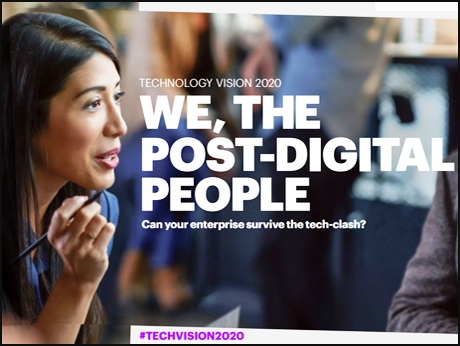Bangalore February 14 2020: The 20th edition of Accenture’s (NYSE: ACN) annual report predicts the key technology trends that will redefine businesses over the next three years.
According to the report, “We, The Post-Digital People: Can your enterprise survive the ‘tech-clash?,” even though people are embedding technology into their lives more than ever before, organizations’ attempts to meet their needs and expectations can fall short. As companies enter the decade of delivering on their digital promises — and in a world where digital technology is everywhere — a new mindset and approach is required.While some have referred to today’s environment as a “tech-lash,” or backlash against technology, that term fails to acknowledge the extent to which society is using and benefitting from technology. Rather, it’s a tech-clash — a clash between business and technology models that are incongruous with people’s needs and expectations.
Of the more than 6,000 business and IT executives worldwide that Accenture surveyed for the Technology Vision report, 83% acknowledge that technology has become an inextricable part of the human experience. As part of the research this year, Accenture also surveyed 2,000 consumers — 70% of whom expect their relationship with technology to be more or significantly more prominent over the next three years.
Says Paul Daugherty, Accenture’s chief technology & innovation officer: “Today we’re seeing a tech-clash caused by the tension between consumer expectations, the potential of technology, and business ambitions — and are now at an important leadership inflection point. We must shift our mindset from ‘just because’ to ‘trust because’ — reexamining our fundamental business and technology models and creating a new basis for competition and growth.”
According to the report, continuing with existing models doesn’t just risk irritating customers or disengaging employees, but could permanently limit the potential for future innovation and growth. But tech-clash is a challenge that can be solved. The Technology Vision identifies five key trends that companies must address over next three years to defuse tech-clash and realize new forms of business value that will be driven in part by stronger, more trusting relationships with stakeholders:
- The I in Experience. Organizations will need to design personalized experiences that amplify an individual’s agency and choice. This turns passive audiences into active participants by transforming one-way experiences — which can leave people feeling out of control and out of the loop — into true collaborations. Five in six business and IT executives surveyed (85%) believe that competing successfully in this new decade requires organizations to elevate their relationships with customers as partners.
- AI and Me. Artificial intelligence (AI) should be an additive contributor to how people perform their work, rather than a backstop for automation. As AI capabilities grow, enterprises must rethink the work they do to make AI a generative part of the process, with trust and transparency at its core. Currently, only 37% of organizations report using inclusive design or human-centric design principles to support human-machine collaboration.
- The Dilemma of Smart Things. Assumptions about who owns a product are being challenged in a world entering a state of “forever beta.” As enterprises seek to introduce a new generation of products driven by digital experiences, addressing this new reality will be critical to success. Nearly three-quarters (74%) of executives report that their organization’s connected products and services will have more, or significantly more, updates over the next three years.
- Robots in the Wild. Robotics are no longer contained to the warehouse or factory floor. With 5G poised to rapidly accelerate this fast-growing trend, every enterprise must re-think its future through the lens of robotics. Executives are split in their views of how their employees will embrace robotics: 45% say their employees will be challenged to figure out how to work with robots, while 55% believe that their employees will easily figure out how to work with them.
- Innovation DNA. Enterprises have access to an unprecedented amount of disruptive technology, such as distributed ledgers, AI, extended reality and quantum computing. To manage it all — and evolve at the speed demanded by the market today — organizations will need to establish their own unique innovation DNA. Three-quarters (76%) of executives believe that the stakes for innovation have never been higher, so getting it “right” will require new ways of innovating with ecosystem partners and third-party organizations.
